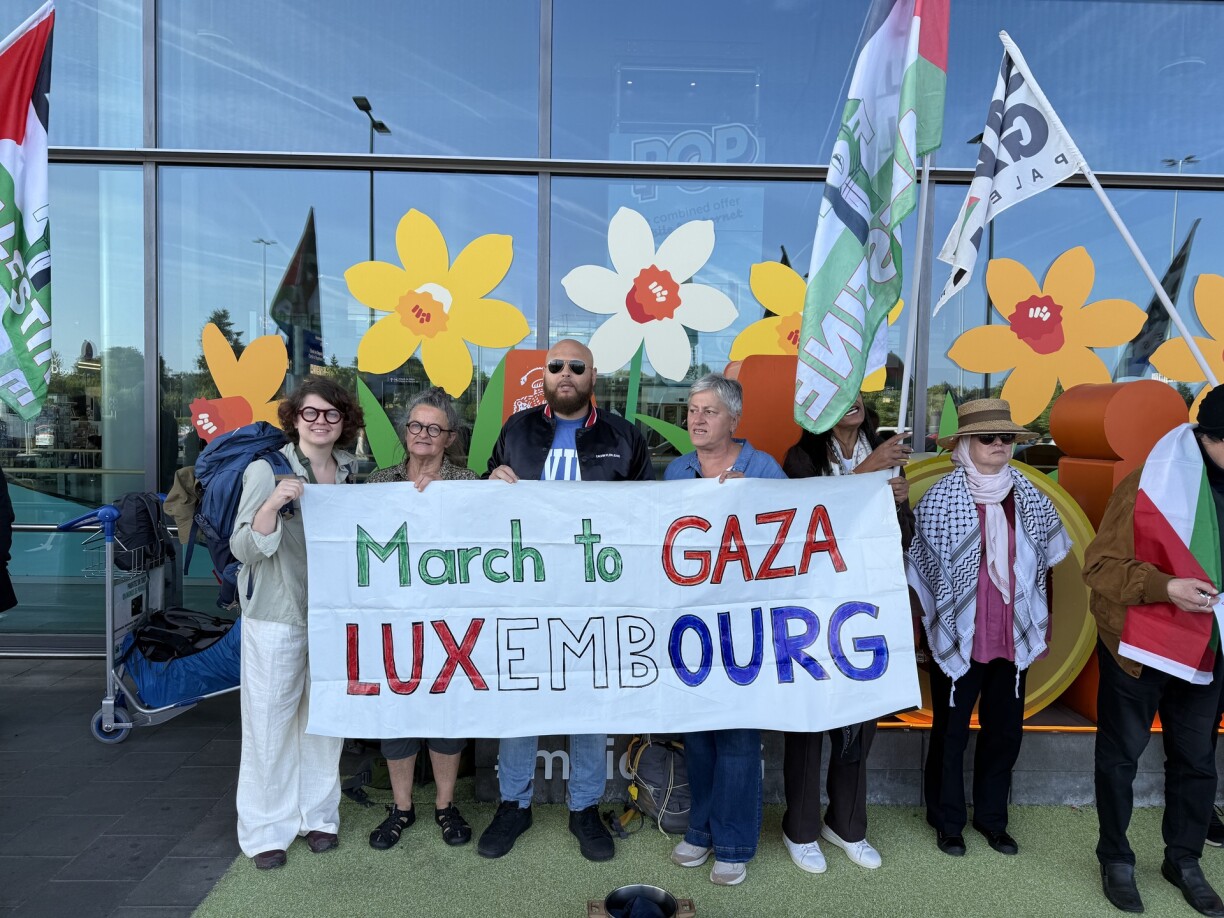
Findel airport is no stranger to emotional goodbyes, but this Wednesday, it became the site of an unusually passionate send-off. Around 40 supporters gathered with flags and chants as they wished five Luxembourg volunteers courage on their journey to Gaza.
The March to Gaza is a peaceful initiative calling for humanitarian access to Gaza, explains Georgette Hein, one of the five volunteers. “It began as an international appeal from doctors who wanted to raise awareness about the catastrophic humanitarian situation there,” she adds.
Hein describes Gaza as an overcrowded ‘open-air cage’, where all surrounding infrastructure has been destroyed and residents live under constant threat of being shot at. The closed borders mean ‘no food, water, or medicine’ can reach those inside. “People are being starved while the world watches.”
Also among the group is Lalla Zineb Bouanani, who lives with a disability and feels deeply for the disabled children in Palestine. “I have access to treatment here in Luxembourg, so I cannot imagine suffering through that pain without medicine. It’s terrible, which is why I’m marching.”
The group has been organising weekly protests since the Israeli military response to the October 7 attack in 2023, but recent escalations and what they see as governmental indifference have pushed them to take further action.
Together with Maya German, Mira Pinzi, and Samuel Taqui, Bouanani and Hein fly out to Cairo via Istanbul on 12 June. There, they will join delegations from around 50 countries. On 13 June, the volunteers will travel by bus to Al Arish, before setting off on a two-day, 50-kilometre march across the Sinai desert.
Their route to Gaza, however, remains uncertain. At the time of departure, Egyptian authorities had not yet clarified whether the march would be permitted to approach the border.
In the best-case scenario, ‘assuming no obstruction from either Egyptian or Israeli authorities,’ the marchers plan to camp near the border from 15 to 19 June before making their way home. “I’d be disappointed if we couldn’t walk all the way to Rafah,” says Bouanani. “I hope that the people of Gaza hear us.”
Dalia Khader, who will coordinate communications between the five volunteers and Luxembourg audiences, stresses the importance of visibility and public pressure. After all, there’s safety in numbers, but also in visibility. “We’re in touch with legal experts in Luxembourg and abroad, but we hope our government will intervene if needed.”
No matter how far they get, the group wants to spotlight the growing disconnect between public opinion and political action. Khader, a Palestinian Luxembourger, puts it simply: “We want to show the people of Gaza that the world, its people, do care. That’s what gives me hope, and that’s what I want to pass on to my family and friends in Palestine.”
Hein sees civilians stepping up where governments are failing. “Take the dockworkers in Marseille who refuse to load military equipment.” At the same time, she points to the Spanish government’s decision to halt arms sales to Israel. “I think it’s terrible to see states advocating for a ceasefire while continuing to supply weapons,” she laments.
Already earlier this week, a group of twelve civilians – including Swedish activist Greta Thunberg and French MEP Rima Hassan – attempted to reach Gaza by sea. They were intercepted and deported by Israeli forces in international waters, with eight still reportedly detained. Yet the action generated momentum for the March. “The idea is to break the siege both by land and sea,” Khader notes.
“There’s enormous value in what they’re doing, not just for Gaza,” she concludes. “Our politicians have forgotten that humanitarian element, but our people haven’t. And that, to me, says more about Luxembourg than anything our government has done.”
Three volunteers safely admitted into Egypt; fourth clears transit after initial block